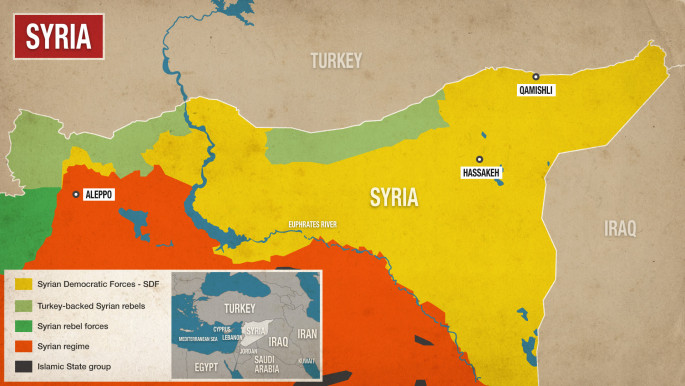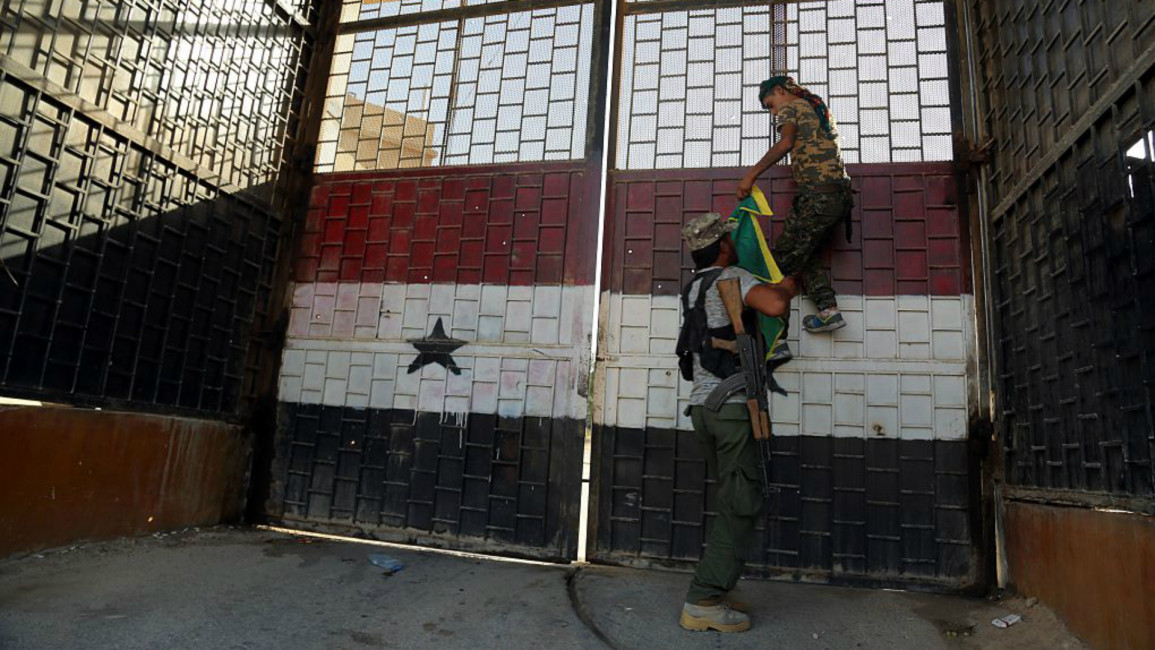Follow us on Facebook, Twitter and Instagram to stay connected
Syrian regime and Kurdish forces clash over 'blockade' of government district
Syrian regime and Kurdish forces clash over 'blockade' of government district
Tensions are rising between Syrian regime and Kurdish forces in northeast Syria.
4 min read
There have been years of tensions between Kurdish and regime forces in Hassakeh [Getty-file photo]
Syrian regime and Kurdish forces have engaged in deadly clashes in northeast Syria after tensions erupted over dire shortages of basic goods - such as fuel, bread, and water - in a government-held area of Hassakeh.
It follows reports of a firefight in the northeastern city between Kurdish security forces, known as Asayish, and regime militias, after angry demonstrations over a perceived blockade on the government district.
One regime supporter was shot dead at a demonstration on Sunday in Hassakeh. Syrian state media claimed the man was a victim of Kurdish gunfire on the demonstration.
Videos from Sunday's event show groups of men in the fortified regime district chanting pro-Assad slogans and approaching an Asayish checkpoint. Gunfire is heard in the background and the men flee.
Kurdish sources claim that the man died after armed clashes erupted at the Asayish checkpoint.
"From our sources, we've heard that one member of the Syrian forces was killed, likely in self-defence from the Asayish returning fire," the Rojava Information Center (RIC) told The New Arab.
"Three others, maybe more, were wounded and we're unsure if they're civilians or members of the Syrian forces."
Kurdish authorities and NGOs in northeastern Syria have also warned of shortages of medical supplies due to the closure of the Bab Al-Salam border crossing after a UN vote.
The Rojava Information Center (RIC) said that while there are restrictions on movements in-and-out of the regime enclaves, Kurdish security forces have not prevented essential supplies from reaching the areas.
But the centre also admitted that the measures in Hassakeh might have contributed to the scarcity of food, fuel, and water in the government district.
"We know that the Asayish haven't been allowing military personnel to leave or enter the security zones, and as recent as last week stopped allowing vehicles moving between the two areas," the RIC said.
"Civilians who live in the Syrian government-controlled areas are allowed to cross the checkpoints only by foot. I would imagine this makes it harder to transport fuel and water to people's homes, but these items aren't expressly forbidden to take across the checkpoints."
The Asayish have announced they will scale down the security measures "as a sign of good faith".
The regime-held zones in Hassakeh and Qamishli both lie deep within areas of Syrian-Kurdish control, with tensions between the two sides sometimes erupting into conflict.
Russia - which has forces in the area and supports Bashar Al-Assad's regime - has played a mediating role when clashes have broken out, and are likely to work to end the current tensions, according to the RIC.
The latest spell of violence follows a rivalry between the regime and US-backed Syrian Democratic Forces (SDF) for control and influence of resource-rich areas in eastern Syria.
"For months, there has been a gradual rise in tensions in the SDF territories, which is also fuelled by the actions of the regime which want to show Kurdish forces that Assad is a factor in this part of Syria," Ruslan Trad, co-founder of De Re Militari, told The New Arab.
Russia has cordial ties with the Kurdish forces but also supports Assad's claims that SDF territories should come back to regime control, after its near-decade long period of Kurdish self-rule.
"The Assad regime wants to regain control of the area and believed it could do through negotiations and promises to the Kurds. This has is not happening at the moment," said Trad.
Russia, which has played a balancing role during periods of Kurdish-regime tensions, has also increased its military presence in the region with the movement of "Wagner" mercenaries, according to Al-Araby Al-Jadeed, a sister newspaper of The New Arab.
"This is a sign of support for Assad but also signals that Moscow is tired of fruitless negotiations... the regime will not leave without a fight and it is clear that it considers Kurdish forces in the area as just an obstacle, and not a real force," he added.
In recent months, Kurdish militias have also engaged in skirmishes with Turkish troops and Syrian rebel groups in northern Syria, adding to the sense of insecurity in SDF areas.
"Kurdish forces are afraid that Moscow and Assad are negotiating with Turkey over the future of northeastern Syria. The SDF will continue to make problems for the regime in Hassakeh and other areas," said Trad.
"We should expect more tensions and clashes in northeastern Syria to continue because the problems of control are still not resolved."
Videos from Sunday's event show groups of men in the fortified regime district chanting pro-Assad slogans and approaching an Asayish checkpoint. Gunfire is heard in the background and the men flee.
Kurdish sources claim that the man died after armed clashes erupted at the Asayish checkpoint.
"From our sources, we've heard that one member of the Syrian forces was killed, likely in self-defence from the Asayish returning fire," the Rojava Information Center (RIC) told The New Arab.
"Three others, maybe more, were wounded and we're unsure if they're civilians or members of the Syrian forces."
Kurdish authorities and NGOs in northeastern Syria have also warned of shortages of medical supplies due to the closure of the Bab Al-Salam border crossing after a UN vote.
The Rojava Information Center (RIC) said that while there are restrictions on movements in-and-out of the regime enclaves, Kurdish security forces have not prevented essential supplies from reaching the areas.
But the centre also admitted that the measures in Hassakeh might have contributed to the scarcity of food, fuel, and water in the government district.
"We know that the Asayish haven't been allowing military personnel to leave or enter the security zones, and as recent as last week stopped allowing vehicles moving between the two areas," the RIC said.
|
|
The Asayish have announced they will scale down the security measures "as a sign of good faith".
The regime-held zones in Hassakeh and Qamishli both lie deep within areas of Syrian-Kurdish control, with tensions between the two sides sometimes erupting into conflict.
Russia - which has forces in the area and supports Bashar Al-Assad's regime - has played a mediating role when clashes have broken out, and are likely to work to end the current tensions, according to the RIC.
The latest spell of violence follows a rivalry between the regime and US-backed Syrian Democratic Forces (SDF) for control and influence of resource-rich areas in eastern Syria.
"For months, there has been a gradual rise in tensions in the SDF territories, which is also fuelled by the actions of the regime which want to show Kurdish forces that Assad is a factor in this part of Syria," Ruslan Trad, co-founder of De Re Militari, told The New Arab.
Russia has cordial ties with the Kurdish forces but also supports Assad's claims that SDF territories should come back to regime control, after its near-decade long period of Kurdish self-rule.
 |
| [Click to enlarge] |
"The Assad regime wants to regain control of the area and believed it could do through negotiations and promises to the Kurds. This has is not happening at the moment," said Trad.
Russia, which has played a balancing role during periods of Kurdish-regime tensions, has also increased its military presence in the region with the movement of "Wagner" mercenaries, according to Al-Araby Al-Jadeed, a sister newspaper of The New Arab.
"This is a sign of support for Assad but also signals that Moscow is tired of fruitless negotiations... the regime will not leave without a fight and it is clear that it considers Kurdish forces in the area as just an obstacle, and not a real force," he added.
In recent months, Kurdish militias have also engaged in skirmishes with Turkish troops and Syrian rebel groups in northern Syria, adding to the sense of insecurity in SDF areas.
"Kurdish forces are afraid that Moscow and Assad are negotiating with Turkey over the future of northeastern Syria. The SDF will continue to make problems for the regime in Hassakeh and other areas," said Trad.
"We should expect more tensions and clashes in northeastern Syria to continue because the problems of control are still not resolved."


![President Pezeshkian has denounced Israel's attacks on Lebanon [Getty]](/sites/default/files/styles/image_684x385/public/2173482924.jpeg?h=a5f2f23a&itok=q3evVtko)



 Follow the Middle East's top stories in English at The New Arab on Google News
Follow the Middle East's top stories in English at The New Arab on Google News


